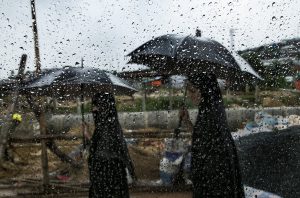Consider being trapped on a remote tropical island. This is the reality for more than 19,000 Rohingya refugees on Bhasan Char, an isolated and flood-prone island in the Bay of Bengal off the coast of Bangladesh.
For more than a year, Bangladesh authorities have detained Rohingya refugees on the island, cutting them off from their community and families in the mainland refugee camps in Cox’s Bazar District. Bangladesh authorities have arrested or beaten Rohingya who attempt to escape the island; other Rohingya have died after their escape boats capsized.
This week, the United Nations special rapporteur on the human rights situation in Myanmar is expected to visit Rohingya refugees confined on Bhasan Char and in the mainland refugee camps to assess their situation. He will likely find a population facing protracted confinement and severe restrictions on the right to freedom of movement.
The U.N. special rapporteur is also expected to meet with Bangladesh government officials, who may attempt to counter the claim that Rohingya are barred from leaving Bhasan Char. For example, on November 30, the Bangladesh authorities facilitated travel for around 68 Rohingya on Bhasan Char to visit the mainland camps in Cox’s Bazar District. However, all refugees had to request permission to travel to the mainland.
Having to ask permission to move is not freedom of movement, by either common understanding or international law. Guarded by Bangladesh security forces and surrounded by barbed wire and security cameras, Bhasan Char is closer to an island prison than an appropriate location for refugees.
Despite this, on October 9, the U.N. refugee agency UNHCR and the government signed an agreement establishing a framework for providing humanitarian services on Bhasan Char. While UNHCR’s access to provide support and protection on the island is a positive step, there are significant shortcomings in the agreement and its development.
First, the government and UNHCR failed to engage in meaningful and widespread consultations with the Rohingya refugee community before signing the agreement. Worse, the authorities tried to keep the agreement a secret, its existence only being publicly revealed after a journalist leaked a copy and posted it online.
Rohingya have a vital stake in what’s happening on Bhasan Char. They must have access to information about the island, including the details of the agreement between the government and UNHCR. Fortify Rights has translated the agreement into the Rohingya language and shared an audio recording with Rohingya refugees and diaspora communities.
However, even before the ink had time to dry on the agreement, on November 25, the authorities transferred more than 350 refugees from the mainland camps to Bhasan Char. Fortify Rights has documented how authorities coerced Rohingya onto the island, and there are indications from refugees and humanitarian workers that the process continues to be coercive with refugees being lured by false promises into relocating.
The Bangladesh authorities have built barbed-wire fences around the island, compounding the detention and sense of hopelessness felt by Rohingya.
Despite these reports, some foreign embassies in Dhaka are hesitant to even discuss the government’s conduct around Bhasan Char for fear of losing humanitarian operating space in the mainland camps. Regardless of the diplomatic silence, refugees on Bhasan Char continue to voice concerns.
“We are now inside a chicken cage,” Abdul (not his real name) told me. Originally from Maungdaw Township in Rakhine State, Myanmar, he fled persecution in Myanmar and is now on Bhasan Char with his wife; but he wants to return to the mainland. He said he felt trapped on the island with no hope and no freedom to leave.
“There is seawater outside the camp, and there is barbed-wire fencing around the camp,” Abdul said from the island. “I feel worried to see the fencing on the island. I was born in Myanmar; there was barbed-wire fencing there too.”
The lack of freedom of movement to and from Bhasan Char has deadly consequences. In August this year, 27 Rohingya refugees including children died in the sea after their boat capsized whilst they were trying to escape the island. In June, three Rohingya children on the island reportedly died of preventable and treatable diarrhea.
Abdul further explained it was difficult to get authorization from the authorities to travel off the island to obtain medical attention, and when the authorities do grant permission, police accompany refugees to the mainland as if they were prisoners.
“When we are sick and go to the CiC [“Camp-in-Charge” – a Bangladeshi government official responsible for refugee management] for the travel authorization to go to Chittagong, he does not give us any travel authorization,” Abdul told me.
Dhaka should ensure that Rohingya like Abdul have the right to freedom of movement and access to healthcare and other essential services, whether on the island or in the mainland camps. Until these rights are upheld, it is irresponsible and dangerous to continue to relocate Rohingya to Bhasan Char.
































